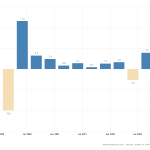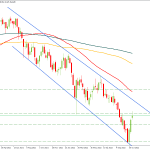FBS analysts: Chinese stocks may recover from 10-year lows
This year was not an easy one for the Chinese economy. Strict Zero-Covid measures, the deepening property crisis, the unchanging rhetoric of China’s Communist party, and the so-called tech war with the US made investors lose trust in Chinese assets. As a result, the Hang Seng 50 index (HK50), which tracks the performance of the top 50 largest Chinese companies, has dropped more than 30% since the start of the year.

However, the rumors about lighter Covid-19 restrictions and the Xi-Biden meeting at G20 raise the possibility of a rebound. Market analysts at FBS dived deeply into China’s economy and came up with the most likely scenarios for Chinese stocks. Behold their analysis and forecasts.
Covid-zero approach vs. the economy
First, let’s look at the negative factors that affect China’s assets in detail. The first factor is, of course, the coronavirus pandemic. While most countries have relaxed their anti-Covid curbs this year, China continues conducting its controversial zero-Covid policy. It was initially introduced in 2021 when the most transmittable Delta variant was spreading. Since then, the zero-tolerance approach to Covid (also known as the elimination policy) has raised significant questions in the global community due to its radical approach to lockdowns, quarantining, and testing. China-based researchers and representatives mention the highly effective results of these measures, as they help to liquidate outbreaks immediately. On the contrary, foreign economists note that the zero-Covid policy hurts economic activity and stability.
The histogram below shows that the Chinese GDP growth slowed in 2021 due to a combination of negative impacts, including the zero-Covid approach.

In November 2022, China finally relaxed some of its strict anti-coronavirus rules, including shortened international arrivals to five days at a hotel and three days at home, a complete opening of international flights and shorter quarantine for close contacts of infected people in China. Still, the softening of the rules will be slow, as millions of older people remain unvaccinated and Chinese vaccines have lower efficacy, according to multiple pieces of research. In addition, it’s widely believed that the zero-Covid policy helps Xi Jinping control power.
Property Market Crisis
Not only Covid-19 bit the Chinese economy this year. The property crisis, which sparked since the pandemic began, sent big real estate developers into default amid a fall in sales and problems with mortgage payments.
In 2020, the Chinese government tried to prevent the debt bomb bubble in the property industry, which appeared due to speculative buying by property developers. New measures included the reduction of new financing to the companies and asking banks to limit mortgage lending to these companies. As a result, at least 18 real estate developers defaulted on offshore bonds. In November 2022, China relaxed some of its rules, allowing developers to access more money from home presales. This news boosted the stocks of Chinese real estate companies.
According to Zhang Xiaojing, director of the National Institution for Finance and Development, the rise in property debt and a slowdown in economic growth resulted in a 275% rise in the debt-to-GDP ratio. As China wants to support the economy with limited options, it will likely try to stimulate economic activity by boosting credits. Analysts fear this kind of policy will result in a recession similar to the Japanese one. All in all, this topic will remain a big issue for the markets in the long term.
US-China relations
While China’s Communist Party has made its first steps towards lighter Covid-19 policy and property market support, there is a big thing that remains controversial – the status of Taiwan. Even after the successful meeting between US President Biden and China’s leader Xi Jinping, Xi once again acknowledged that Taiwan is part of China. His words contradict the US opinion on this matter. China also didn’t support Russia-targeted sanctions and was one of the few countries who voted against Russia’s reparations to Ukraine at the UN National Assembly. This places China on shaky ground, especially in its international businesses, as more restrictions may be applied to them.
What awaits China’s stock market?
Given all the factors mentioned above and the extreme optimism in China’s stock market after Xi Jinping and Joe Biden pledged to collaborate on key issues and solve misunderstandings, FBS analysts think that Chinese assets are now at crossroads, and the technical analysis of HK50 confirms that.
The rejection of the bottom at 14 800 was a critical sign that HK50 would reverse. However, the price keeps moving within a downtrend, with 19 500 acting as a powerful resistance. If this level gets broken, it will mean the start of an uptrend with the next important level at 20 000 (50-week SMA). If the price bounces back from the trendline, FBS expects a retest of 14 800.
By the way, you can take advantage of Chinese stocks with FBS. FBS allows you to trade HK50 and Alibaba in a one platform. You can both sell and buy these assets with a minimal commission.

Bottom line
The November rally in Chinese stocks pleases short-term investors and raises hopes that Chinese assets have finally reached their bottom. However, the long-term problems that still exist can weaken the Chinese market.









